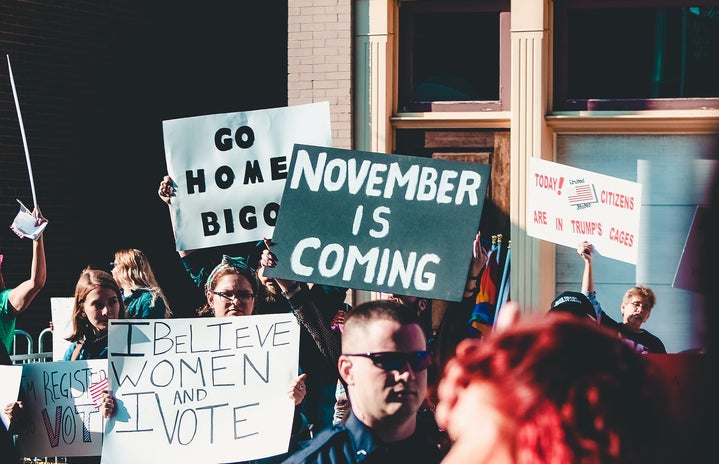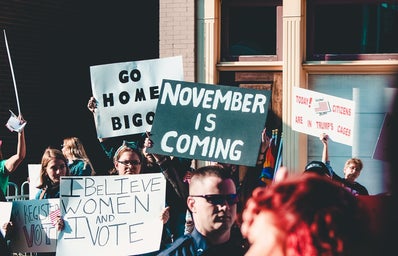Election Day is finally here, and although Joe Biden is leading in the polls, it’s anyone’s guess how states like Texas, Ohio, and Georgia will really end up voting. President Donald Trump and Joe Biden both have a questionable history, having been accused of sexual assault and inappropriate behavior on multiple occasions. America has failed to hold either of these men fully accountable for their actions, allowing them to be the two front runners in the 2020 election. They are far from ideal candidates for president in the eyes of Gen Z voters.
It’s understandable why so many voters are torn this year. While it’s easy to decide not to vote in the November election — or to vote for a third-party candidate, or write in your pick — it’s important to understand the consequences of these actions. Here is why it is so important to vote in the 2020 election, even if you feel it’s for the “lesser of two evils.”

1. Simply put, any candidate other than Biden or Trump will not win
In other countries, there are lots of political parties vying for positions in government, but political parties in the U.S. mostly boil down to two: Democrats and Republicans. While third party candidates, like Gary Johnson of the Libertarian Party and Jill Stein of the Green Party, can and do receive some support from voters, the Electoral College prevents parties like theirs from getting very far in elections. With the Electoral College, a candidate “wins” a particular state if the majority or plurality of people in that state vote for a certain candidate.
Basically, receiving a large portion of the popular vote overall means nothing if you don’t win enough or any electoral votes.
Consider Ross Perot, who ran as a third party candidate in 1992. While Perot won 19% of the popular vote, he failed to win any electoral votes. In 1968, George Wallace also ran as a third party candidate and ended up winning several states and 9% of the electoral vote, but this did not place him anywhere close to victory.
Why does this happen, exactly? If you’ve ever taken a political science class (or you read up on U.S. politics a lot) you may be familiar with Duverger’s Law. Duverger’s Law is the theory that it is extremely difficult for a third party to win because U.S. political systems favor the two major political parties. Historically, this theory has held up: aside from Perot, no third-party candidates have ever won over a large fraction of the country.
In the 2020 election, Jo Jorgensen is the Libertarian Party candidate and Howie Hawkins is the Green Party candidate. Voting for either of these candidates will not do much, especially in an election year as divisive as this one. This isn’t to say voting third party is necessarily a “bad” thing — third party candidates often run not to win, but to make it more difficult for major candidates to win or to gain influence in politics, though this doesn’t always work. And while voting third party could potentially make it slightly more difficult for Biden or Trump to win, the chances of any candidate other than Biden or Trump winning are slim to none.
All of this also applies to writing in candidates. Whether you write in Bernie Sanders, Joe Exotic, or Mickey Mouse for president, you won’t be waving any victory flags for these candidates because they receive so few votes — and, once again, you are taking away votes from the two candidates who actually have a shot at winning.
2. Try to consider the strategic implications of voting for a candidate, rather than the moral ones
If you are against everything Trump stands for, but you don’t particularly like Biden and refuse to vote, Trump may be more likely to win. Of course, without your vote, Biden could very well win anyway — but why not vote for him in order to ensure his victory? It’s impossible to truly predict the outcome of the election right now, but if you are fearful of another four years of Trump, it would be in your best interest to vote for Biden.
It’d be remiss to say you are “voting for Trump” by choosing to abstain from voting — but you are failing to help a candidate who could potentially fix some of the issues that arose during Trump’s presidency, like the rapid reopening of states amidst the COVID-19 pandemic, the decision to end the Deferred Action for Childhood Arrivals (DACA) program, and withdrawing from the Paris Climate Agreement. Voting for Biden or Trump may feel like a moral dilemma, given their negative track records (more on that later), but you can vote for a candidate strategically and not morally, recognizing the issues with the candidate and still agreeing to vote for him.
Jeremy Schahill, in an article for The Intercept, understands this dilemma. “Recognizing that Biden is a terrible candidate and being honest about that but voting for him in an effort to prevent Trump from further consolidating his agenda is a strategically sound position,” he writes. This strategy also applies if you prefer Trump over Biden.

3. Your vote and voice matter — use them!
Individuals have swayed elections before — in 2016, a Vermont Senate Democratic primary was “determined by a single vote”; a New Mexico House seat was decided by just two votes; in 2002, a Connecticut House seat was determined by one vote. Even in the 2016 presidential election, imagine what may have happened had people voted for Hilary Clinton rather than a third party candidate, for instance.
How you vote can determine the outcome of an election. This is especially true if you live in a place that may be considered a “swing state.” If you live in one of these states, your vote can help push the majority toward your preference. According to one interactive map, it is a toss-up as to how states like Arizona, Georgia, or Florida will vote this year. You can be the individual who determines which way these states will swing — how cool is that?
4. Voting for the “lesser of two evils” is the first step in political reform
We should never be excusing cases of violence, sexual assault or the stripping of fundamental human rights, even if the person accused of such acts is sitting in the White House. Voting this November does not mean you are complicit in atrocities such as these. Rather, voting is a statement about how you believe the country can better be run in terms of economics, foreign policy, reproductive rights and more.
If we want to start progressing towards a nation where we do not give rapists or abusers platforms, refusing to vote this November will not allow this progress to be realized because it is not quite that simple. The U.S. has long since been complicit in the atrocities its people commit. In order to combat this, young voters heading to the polls this year can work from the ground up and begin holding the country and its officials accountable for past and present abominations. We will not repair the country overnight, but this election is only a start to the major overhaul. Once we do that, we will slowly but surely steer closer to a country that is capable of repentance and electing benevolent, respectful leaders.
Until we can hold political figures accountable for their actions and never allow them a spot on the ballot in the first place, we must vote strategically this year in order to ensure a better life for ourselves and those around us.


